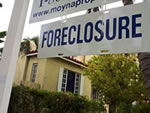Foreclosures
Foreclosure News Items
National Mortgage Settlement controversy, related scams, offset by helpful consumer guides
by Broderick Perkins
(3/19/2012) - Along with the relief it's supposed to bring to millions of Americans, last week's official court filing of the $25 billion National Mortgage Settlement came with controversy, scams and, thankfully, consumer guides to the rescue.

Here's an update.
The federal government and state attorneys general filed details of the Feb. 9 National Mortgage Settlement in U.S. District Court in the District of Columbia on March 12.
The filing included proposed consent judgments with Bank of America Corporation, J.P. Morgan Chase & Co., Wells Fargo & Company, Citigroup Inc. and Ally Financial Inc., to resolve violations of state and federal law. Court documents are available online and a web site has been dedicated to the National Mortgage Settlement.
The ground-breaking joint agreement is the largest federal-state civil settlement ever obtained and comes as the result of investigations by federal agencies, state attorneys general and state banking regulators across the nation.
The settlement is payback for a culture of foreclosure violations including "robo-signed" (forged or falsified) affidavits in foreclosure proceedings; deceptive practices, including "dual tracking" (simultaneously working a modification application and a foreclosure procedure on a mortgage); failures to offer non-foreclosure alternatives before foreclosing on borrowers with federally-insured mortgages; filing improper documentation in federal bankruptcy court, losing and misplacing crucial homeowner documents and generally giving distressed homeowners the runaround, rather than a single point of contact, for starters.
Benefits include assistance for those who've lost homes to foreclosures, those facing foreclosure or defaulting on a mortgage payment and those who are current on their mortgage but owe more than the home is worth.
• Along with provisions for as many as 3 million civilians the settlement is also a military victory.
Due to the nature of military life, military families struggling through the housing crisis suffer a unique and more complicated set of circumstances than civilians. The settlement's benefits for hundreds of thousands of military personnel effectively bolster provisions in the existing Servicemembers Civil Relief Act (SCRA).
Not everyone is happy with the deal.
• The settlement is likely to surpass $25 billion, but there's general too-little, too-late criticism about the deal, which could take three years to fully deploy. During that time, critics say, lenders are likely to engage in more foot dragging as they wrangle over the details.
That's evidenced in "Servicers Continue to Wrongfully Initiate Foreclosures: All Types of Loans Affected" a recent study from a group of consumer law advocates that says mortgage servicers continued foreclosure abuses even while the deal was being negotiated.
• The voice of mortgage securities investors, the Association of Mortgage Investors (AMI), questions the settlement's impact on securities investors and a potential, resultant trickle down negative effect on consumers.
Some of the mortgages impacted by the settlement have been sold and repackaged, along with other home loans, as mortgage securities and, while securities' stakeholders had no say in the agreement, they could suffer losses, AMI says.
Some securities are bundled into mutual funds and retirement and long-term investments for pension and retirement funds for a range of public institutions, including those for unions, teachers, and first-responders.
"Unfortunately the settlement will also potentially draw billions of dollars from those not a party to the settlement, including public institutions, unions, and individual investors to fund the remedy. While, we believe it is unfair to settle claims against the robo-signers with other people's funds, if such an outcome is to be mandated, we request that a meaningful cap be placed on the dollar amount of the settlement satisfied by innocent parties, who were never responsible for robo-signing," AMI included in a prepared statement.
• In an effort to "set the record straight" on misunderstandings over the settlement, the U.S. Department of Housing and Urban Development's (HUD) public affairs office blogged "Myth vs. Fact: Setting the Record Straight about Historic Mortgage Servicing Settlement."
The National Mortgage Settlement is just the beginning
Among the topics, the blog:
Dispels rumors about a "taxpayer subsidy." There is none, HUD flatly says.
Reminds wronged consumers that those who receive payments are not prevented from seeking further monetary redress through federal banking regulators or private litigation.
Says, while the settlement could affect some investor-own loans, that will be an exception rather than the rule, given layers of built-in provisions to prevent losses.
Insists banks aren't getting off the hook. The mortgage settlement is just the beginning of mortgage servicers comeuppance. State and federal authorities can and, in some cases, already have pursued additional claims or other efforts to bring violators to justice. To date, many mortgage relief programs have been voluntary. The settlement is an agreement banks signed off on to meet mandates in delivering cash payments, principal reductions and other help. The settlement also forces servicers to fix the problems that led to foreclosure processing violations. Joseph A. Smith, North Carolina's banking commissioner since 2002, has been selected to oversee implementing the settlement and has the power to impose penalties of up to $5 million for violations.
Says those "too-little, too-late" criticisms don't take into account, given other efforts being pursued, the agreement was never meant to be a be-all, do-all, end-all solution to the mortgage meltdown. The settlement addresses the servicing aspect of the crisis, which did not create the housing crisis. A Residential Mortgage Backed Securities Working Group is investigating initial causes of the crash.
• Even before the ink was dry on the settlement, scammers were tarnishing the agreement by using the Internet and tele-marketing guises to masquerade as settlement officials, bank representatives and third-party "settlement administrators" promising fast settlement results — for a fee — to unsuspecting, vulnerable consumers, according to attorneys general in virtually every state in the nation.
• To help ward off scammers looking to re-victimize consumers, attorneys general and the National Mortgage Settlement issued fraud warnings and avoidance tips, while the Center For Responsible Lending (CRL) published "Are You Eligible for Mortgage Relief?"
While the settlement's own web site has a host of related information, CRL's preliminary guide is more consumer-friendly, offering an overview of the settlement, timeline information, eligibility requirements for assistance and potential benefits.
The guide comes with scam-avoidance information and offers broad eligibility requirements, as well as more specific requirements for those who've already lost their homes to foreclosure; for those current on their home loans but underwater (owing more than their home is worth); and for those late on their mortgage or at risk of being late.
Along with eligibility guidelines for each category, CRL's guide also reveals the application process and the level of assistance or benefits potentially available for those in each category.
More Related Articles:
More homeowners consider strategic defaults, perhaps to their detriment
Foreclosure abuses continued during year-long National Mortgage Settlement negotiations
National mortgage settlement scams surface before official settlement signed
4.5 million get 90-day foreclosure review extension
Five mortgage servicers agree to $25 billion 'National Mortgage Settlement'
Mortgage lenders offer states $25 billion 'robo-signing' settlement

